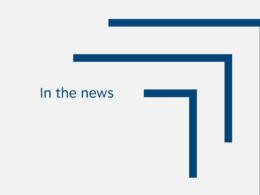Helping your customers understand interest rate swaps
Summary
Learn how to help your commercial customers understand why an interest rate swap makes sense.What are the two key things that will help your customers understand the value of an interest rate swap?
- Make sure that the customer understands the basics of a swap and how it works in conjunction with a floating rate loan originated by your institution to provide fixed-rate debt service.
- Explain the benefits of offering as an alternative to traditional fixed-rate financing.
What are the two inherent key risks of a traditional fixed-rate loan?
Credit risk and interest rate risk
Pairing an interest rate swap with a floating-rate loan allows your bank to separate out the credit risk from interest rate risk. This can allow for the bank to offer longer-term loans because the bank doesn’t take on interest rate risk with a floating rate loan. It can also mean that the swap rate could be lower than the same maturity fixed-rate loan because you don’t have to build in an interest rate risk premium into the loan’s pricing.
Right there you have two potential comparative benefits compared to a fixed-rate loan: floating-rate loans with a swap can offer the ability to lend longer and at lower rates.
The bifurcation of the customer’s financing from his or her interest rate allows for more flexibility in coming up with a custom solution to fit the project.
Typically, there is not an option to lock in a rate at some point in the future (e.g. at the end of a construction period) with a traditional fixed-rate loan. Usually, you would have to wait until the project is stabilized and a CO obtained before the bank would fix the rate at treasuries or FHLB plus a spread. With a forward starting swap, you can lock in that rate at the time the construction loan is closed. We see many borrowers take advantage of this flexibility.
What is one of the biggest advantages of an interest rate swap compared to a fixed-rate loan?
One of the biggest comparative advantages between a swap and a fixed-rate loan has to do with prepayment. This is where swaps had gotten the short end of the proverbial stick because we’ve experienced a period of extremely low interest rates over the last decade and a half.
An interest rate swap will have value — positive or negative — depending on where the swap rate is relative to the current market swap rate for its remaining term; or it’s replacement rate.
As the forward curve dropped over the last 15 years, swaps that were done in the mid-2000s took on liability positions. If a borrower wanted to refinance or sell their underlying asset, thus paying off their loans, they would be faced with these swap liabilities. That has translated into many borrowers, with long memories, being opposed to doing swaps. It is important to understand how very different today’s rate environment is from the mid-2000s.
As we sit here in the spring of 2020, interest rates are generally lower than they have been for most of the last 20 years. That means the magnitude of the downward moves in rates is much smaller than possible upward moves, if we assume that rates cannot go below zero.
As such, we’re in a situation where swap-based prepayment is — in many cases — the most favorable outcome, when compared with yield maintenance, defeasance or declining balance (that is, 5-4-3-2-1) — all of which are traditional fixed rate loan prepayment penalties. Further, because a swap can actually be an asset to your borrower, it’s possible that the bank would pay the customer for terminating a swap early.
Subscribe to receive our market insights and webinar invites
Disclaimers
Chatham Hedging Advisors, LLC (CHA) is a subsidiary of Chatham Financial Corp. and provides hedge advisory, accounting and execution services related to swap transactions in the United States. CHA is registered with the Commodity Futures Trading Commission (CFTC) as a commodity trading advisor and is a member of the National Futures Association (NFA); however, neither the CFTC nor the NFA have passed upon the merits of participating in any advisory services offered by CHA. For further information, please visit chathamfinancial.com/legal-notices.
Transactions in over-the-counter derivatives (or “swaps”) have significant risks, including, but not limited to, substantial risk of loss. You should consult your own business, legal, tax and accounting advisers with respect to proposed swap transaction and you should refrain from entering into any swap transaction unless you have fully understood the terms and risks of the transaction, including the extent of your potential risk of loss. This material has been prepared by a sales or trading employee or agent of Chatham Hedging Advisors and could be deemed a solicitation for entering into a derivatives transaction. This material is not a research report prepared by Chatham Hedging Advisors. If you are not an experienced user of the derivatives markets, capable of making independent trading decisions, then you should not rely solely on this communication in making trading decisions. All rights reserved.
20-0152





